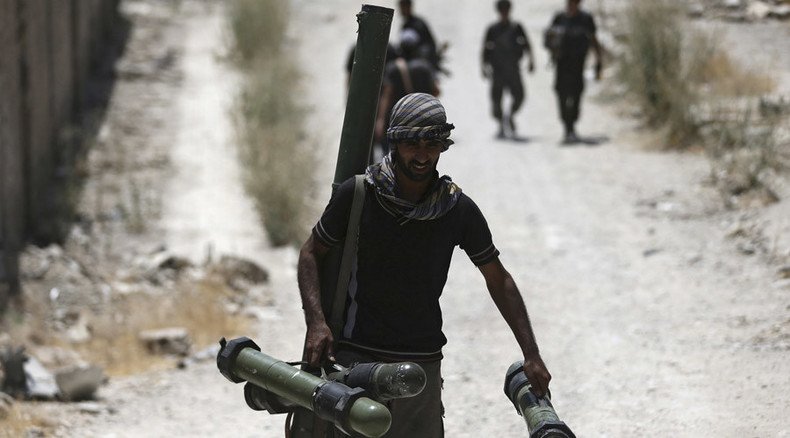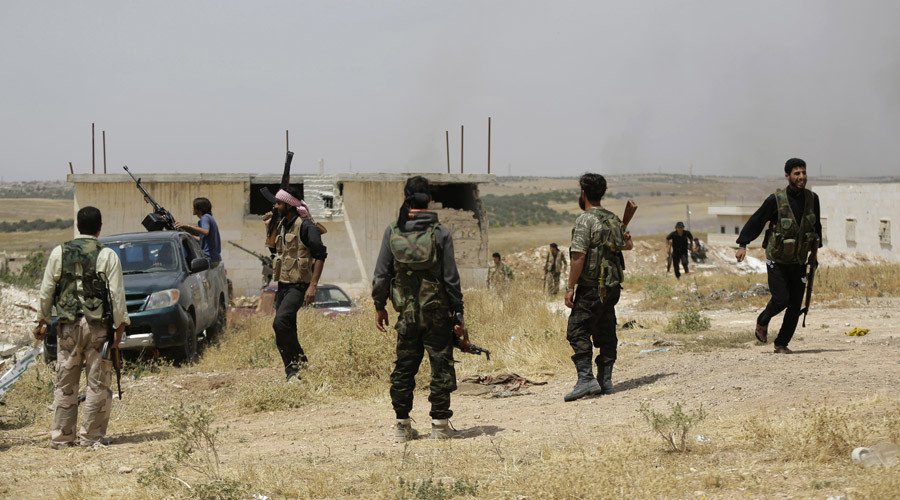US fighter jets ‘may target Syrian government’

By approving the Pentagon’s proposal of expansion of airstrike rules of engagement, Obama has redefined who the US can hit, and it now includes Syrian government forces, retired US Air force Lieutenant Colonel Karen Kwiatkowski told RT.
President Obama approved airstrikes in Syria on Friday. US warplanes could begin to target government forces in Syria if they consider them to be a danger to Pentagon-trained rebels. US officials say the force will be used to defend fighters from the Al-Qaeda linked Al-Nusra front.
RT: How is the purpose of these expanded airstrikes in accordance with international law?
Karen Kwiatkowski: I think I have to agree with the State Department that you can’t really identify any legal basis for what President Obama has done. The only thing we have to remember is that this was requested by the Pentagon. The Pentagon proposed this expansion of airstrike rules of engagement, I guess you can call it, and Obama approved that. So the administration, the Pentagon in particular, somehow thinks that they need this enhanced definition of who they can hit with airplanes, and it includes the Syrian government. I think when you look at it in that way, it is a serious change.
READ MORE: Protecting US-trained Syrian rebels? There’s no such thing as ‘defensive airstrikes’
RT: US State Department deputy spokesperson Mark Toner basically said today, that any action to protect the US-backed rebels would be defensive only. What is your reaction to this statement?
KK: I don’t think I can agree with their use of the word ‘defensive’. When you talk about airstrikes, you’re really talking about offensive or retaliative, you’re not talking about defensive. The people that we’ve trained - the 60 so-called, I know that the US intended to train far more, but the number of trained US trained forces that might be engaging with ISIS in Syria is so small that to have the air force cover them defensively - this doesn’t make any sense at all. I have to think that this is really a provocation geared to covering somebody’s butt one way or the other: Whether they have already done something, they shouldn’t have done, and they have to change the rules, so that we can get away with it.
We don’t really know who is fighting who, and who is doing what in Syria. I don’t think we are getting clear information about that. Maybe we’ve already done something that we shouldn’t have done under the previous rules of engagement, so they have to expand it; or, as the Pentagon requested, they need more freedom to hit more targets. Some of those targets may include Syrian government targets that are part of the Syrian government. Of course that is an act of war. But I would think bombing inside of the territory of any sovereign nation is an act of war, which means we’ve been at war with Syria for a while. Our rhetoric is very anti-Syria; the activities that we’re doing are anti-Syria, as well as anti-ISIS, and that’s assuming that you don’t think we’re part of ISIS. We have certainly benefited ISIS.
So it’s not clear what’s happening on the ground. What is clear is the policy shift is reflecting probably either anticipation, or covering-up, or preparing to make an excuse for something that has already happened. That would be my reading of it. I don’t really trust anything that the US government says when it comes to legal or illegal in terms of interventions and wars overseas because we don’t want follow any particular rules and haven’t done so for some time.

RT: Do you think it's possible to use international law to halt these new airstrikes?
KK: If we look just at the UN, I don’t see that they have stood for anything pro or con, in fact they seem to be rubber stamping whatever the US wants. There is a benefit when you pay and fund most of the UN operating costs, which the US does, and that means you kind of own them. I don’t see that the UN is standing up for anything that remotely looks like objectivity or justice. If it happens certainly I would welcome it. Possibly those countries that are interested in tamping down instead of firing up the war that is going on within Syria’s borders, those guys may be able to use the illegality of what has been done to kind of make their case.
But I don’t know who is listening. The Obama administration is not listening, the Pentagon is not listening and the American people are not paying attention. The Congress is getting ready to go on fall recess, if they haven’t already. I’m not sure how you’re going to change this. You just have to continue to watch the situation very closely, and remember that the number of trained US forces that are engaging within Syria or even in the region itself is extremely small, very small numbers. And yet, to justify airstrikes for these very small numbers, there is something a little bit fishy about that, there is something a little curious about it. So I would anticipate more complications to come and possibly new stories to come about what is really going on there.
Republicans oppose everything Obama does
John Graham former US diplomat argues that the Republican party doesn't want the US president to take credit for anything. “They oppose practically everything that he does. He could declare that the sky is blue and they would try to pass a resolution saying that it was not,” he said.
RT: The US has expanded the purpose of its airstrikes now to include defending rebels, is that in accordance with international law to take such steps?
John Graham: It’s interesting, people talk about international law; my long history convinces me that in the war-torn areas of the world, like the Middle East, it tends to mean very little. The State Department’s spokesman was not able to give you [RT] a straight answer (Chichakyan asking the question), and I don’t know if anyone can. If the US goes to the UN seeking a resolution, the Russians will probably veto it.
Our [US] main concern is fighting ISIS, fighting terrorism which is our biggest threat now; it seems to be ISIS even more than Al-Qaeda. [They are] very dangerous people. So we’re willing to go to some lengths to do that. We’re bombing them directly, and now we’ve introduced some of our own trained fighters, so-called New Syrian Forces, to act basically as spotters to help us target ISIS contacts.
I think your original surmise about us now being ready to attack [Bashar] Assad is an exaggeration. We had a chance to attack Bashar Assad three-four years ago, when President Obama famously drew his red line and then walked away from it. We don’t want to do that, we really don’t want to attack Assad. But we have warned him very clearly, we’ve used very tough words to say: “Look, we’re going to attack ISIS on Syrian territory, and you better stay out of the way.” I’m pretty sure the Syrians aren’t so stupid as to challenge us on that.
RT: US State Department deputy spokesperson Mark Toner basically said today, that any action to protect the US-backed rebels would be defensive only. What is your reaction to this statement?
JG: Of course it would be defensive. There are only 60 of these so-called New Syrian Forces - people that we’ve trained. That is hardly enough to mount a serious military threat against Al-Nusra or others attacking them. So yes, it’s defensive and we will defend the New Syrian Front whose purpose is, as far as I can tell, is not so much to fight, but to pinpoint locations for targeting ISIS targets, so as to minimize civilian causalities.
In terms of offense and defense, I go away back, including the war in Vietnam. Politicians from all countries use the word defensive as an excuse. If I may say so, Russia has claimed that some of these actions in Crimea and in Eastern Ukraine are defensive, and many people disagree with that. So, it is a game people play, and the words ‘offense’ and ‘defense’ are almost meaningless.
RT: The decision to expand the campaign has been taken while Congress is on its summer break. What do you think of the timing of this decision?
JG: It is obviously taken so Congress is not in the way. As your listeners, viewers and [readers] well know, President Obama now has the House of Representatives and Senate both controlled by the opposing [Republican] party. They don’t want to give him an advantage in anything. They don’t want him to take credit for anything. They oppose practically everything that he does. So he really feels that he has no choice, but sometimes to act in ways… without having to formally ask for congressional opinion or approval.
The statements, views and opinions expressed in this column are solely those of the author and do not necessarily represent those of RT.
The statements, views and opinions expressed in this column are solely those of the author and do not necessarily represent those of RT.












